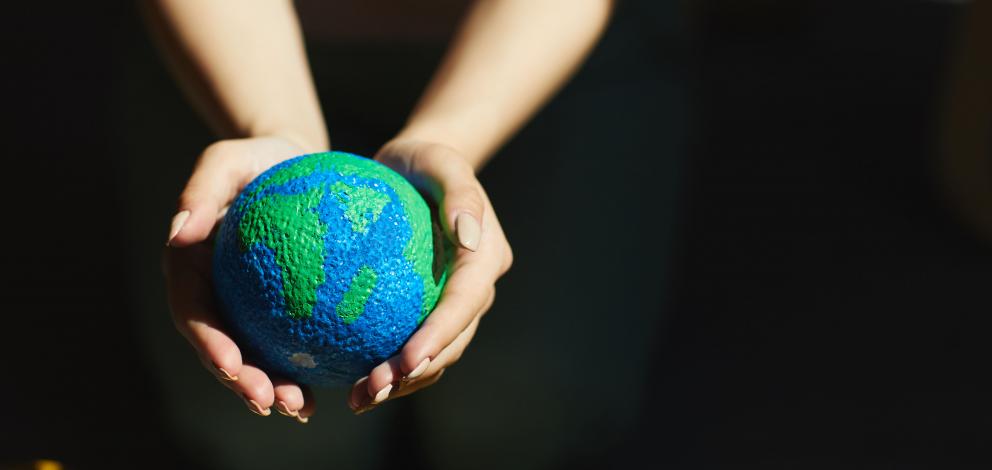You are here
The Veterinary Professional’s Role in Combating Climate Change

One of the biggest issues facing our planet is climate change. This has been well documented in the news over the past year with reports of extreme weather and climate-related events experienced throughout the country. The summer of 2021 featured heat and drought not experienced in Alberta in years. Wildfires, though still a concern in Alberta, were out of control in British Columbia, with smoke drifting over Alberta for many days causing air quality issues for livestock and pet owners.
This fall and early winter, flooding along the BC coast and into the interior truly brought the plight of livestock owners to light after numerous livestock farming operations were affected including the loss of many operations. The warm Pacific air that brought extreme rain to British Columbia pushed its way eastward to Alberta causing chaos as freezing rain grabbed the headlines on many days in November and December. With all of the extreme weather and the aftermath of these weather related events, it is undeniable that our climate and ecosystem is changing, and not only does the veterinary community need to be prepared for the change, so does the public at large.
The Environmental Impact on the Health of Animals
Extreme weather events and higher than average temperatures can cause stress in animals. It can also impact animal growth, milk production and reproduction. Climate change may also affect disease behaviour and present major challenges for the future of animal agriculture on a worldwide level. Even though the changing environment is causing challenges for pets and livestock, there is still hope that as a global community, we can turn it around. There are numerous examples of nature healing itself, when given the opportunity, and we can all make a difference… including veterinary professionals in our home communities and practices.
Recent CVMA Conference in Calgary Reveals Climate Crisis Challenges
During the CVMA National Forum hosted in Calgary in July 2021, an online workshop was held focusing on Veterinarians as Leaders on Adaptation to Climate Change. Dr. Jonna Mazet, renowned professor of Epidemiology and Disease Ecology at the University of California Davis School of Veterinary Medicine (UC Davis) and Executive Director of the UC Davis’ One Health Institute was one of the keynote speakers at the conference. She presented facts pointing to the worldwide food crisis, collapsed beehives/bee populations and recent extreme weather as all being critical warning signs of climate change. As part of her research, Dr. Mazet and her team has recognized more pathogens in the Pacific Ocean that correlate with the melting polar ice cap in the Arctic Ocean. She went on to explain how the climate crisis as well as animal health and human health are all linked, and explained how a One Health approach offers hope for livestock, pets and the people who care for animals.
Dr. Courtney Howard also spoke at the conference and shared her findings from the Canadian North. Part of her discovery is that Canada’s North is changing at two or three times the rate of the rest of the world, and the migration of certain species of animals could soon affect domestic animals as well as people. She feels that veterinarians need to be part of the dialogue on combating climate change, sooner rather than later. You can view the presentations of Dr. Mazet and Dr. Howards at the 2021 CVMA National Issues Forum - Veterinarians as Leaders on Adaptation to Climate Change video.
Veterinarians and Veterinary Technologists Can Help by Opening up Dialogue with Clients
Finding solutions to climate change isn’t something that will happen overnight. Veterinarians and their clients can do their part by starting a conversation and start looking at practical solutions. An excellent resource on climate change is available for download.
Produced by the Food and Agricultural Organization (FAO) of the United Nations, this booklet is full of helpful information on how to improve animal health in the midst of climate changes. The FAO also presents opportunities for action – including developing capacity to tackle animal disease events triggered by climate change, promoting One Health approaches, and investing in public and private collaboration and research.
Having a Positive Impact on the World
The world is more closely connected than ever before. And, the ripple effect felt by climate change events have already proven to be challenging for livestock and pets. We can all make a difference together. The first step on a local level is to open up dialogue, get people thinking about their actions, and present the fact that we’re not too late to address the issues resulting from climate change. We can also begin to examine ways to improve conditions for our animals. Ideas as simple as protecting wetlands on farms and ranches or using lower emission light bulbs in our barns and animal shelters are just two small changes that will add up to have a positive impact. It's not too late to take action, and the changes you make in our own home or operation could potentially save the world for future generations.
Resources
- The Impact of Climate Change on Animal Health
- 2021 CVMA National Issues Forum - Veterinarians as Leaders on Adaptation to Climate Change
- Food and Agriculture Organization of the United Nations - Animal Health and Climate Change
